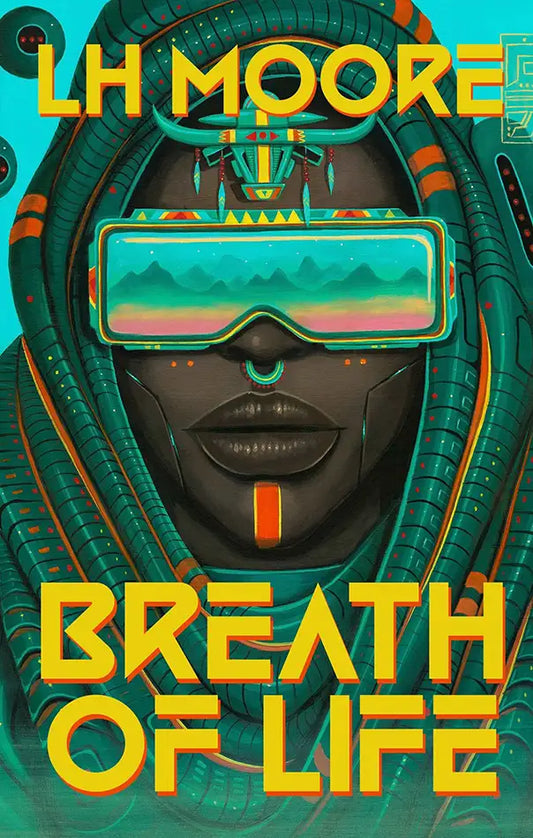
“Love is a parasite meme,” she’d told him once. It would have been Amsterdam, with the poisoned canals and a gibbous moon, made green with atmospheric pollution, gloaming over Station Centraal.
They did not like to use the word love, what they had was something else, a shared loneliness—
He called himself Job because when the world turns rotten all around you, like God’s goddamned apple left out for the snakes, when it kills your family and what friends you had and the neighbours and the neighbours’ dog, then it’s trying to sell you something even while it fucks you.
“You’re a blank,” she used to tell him. They saw each other periodically—under the burnt-out stump of the Tour Eiffel in Paris they had fucked because she wouldn’t say making love, she said you couldn’t, really, not anymore—and later, as they became cold, he tried to deny it.
“I had a life,” he said. “But I could never explain it adequately to people. I was a composite, I never lived in just one place or spoke a single language. I grew up on a kibbutz in Israel, for fuck sakes. Hardly anyone comes from Israel. I’ve lived in the places we used to call South Africa, and in London and Laos—”
“Why is it always London and not the United Kingdom?” she said, stretching.
“Because London is a world, not a city, ” he said.
“It was, not is,” she said.
“I spoke English and Hebrew and Bislama and I could swear in Afrikaans and Thai,” he said, though he lied—he had never got the hang of tonal languages and his Thai had been limited to numbers at the market. “I moved around, I had no cultural anchor.”
“You must have been happy when the world ended,” she said, astutely.
Job never replied to that. She didn’t require a reply. She knew.
The end of the world had been a fucking relief.
In Paris he had spent a long winter once sheltering in an abandoned bookstore on the left bank of the Seine, by Notre Dame. He’d been alone in all of Paris that year, but for a presence he could not explain. Walking through the empty streets of the Latin Quarter at night sometimes he’d hear music, chansons d’amour echoing through the stone houses crowded close together, as though someone, nearby were playing old vinyl records on a gramophone, the quality of the music scratched and old and battered. He hated the invisible player of the music, had hunted for him, but the music and its master evaded him, growing distant the closer he got.
There had only been him and that phantom in Paris that winter, Eve—she had called herself Eve, she had this crazy notion of becoming the mother of a new generation, of repopulating the earth—”Like in a bad sci-fi movie,” she’d told him (in Prague? Or what was left of Budapest?) and laughed, uproariously, qualifying: “I’d rather die than have a fucking kid.”
He wasn’t sure if she was pretty, or if he’d been ugly, in another life. Beauty depended on having something to compare it to and there hadn’t been anyone for a long time. He’d had a lot of time to think in Paris, that winter, surrounded by the dead paper leaves of thousands of books, so much ink had been spilt and now there weren’t any readers.
He liked to think there’d been a reason for what had happened, for why there were no people left. He liked to think of aliens coming, a team of extraterrestrial archaeologists or, even better, some new race evolving out of mice or cockroaches and, millions of years later, digging down to the human layer, marvelling or being amused or simply baffled by what they found, and trying to decipher the dead languages and writing left behind.
He’d slept on a bed of bibles, he read Philip Larkin and Samuel Delany, he found obscure poetry books and ripped out their pages for the fire. From a book of poems by Lior Tirosh:
God rose up that day
in black smoke from the ovens
God
dispersed
to all corners
soot
black soot and ash
flakes
of black snow
falling.
He’d used the page with that poem on it to roll a joint, he’d found a stash of still-usable hashish in a drawer, in a restaurant, he seldom went beyond the Latin Quarter, Paris was too immense when it was empty, it was too quiet and there were things moving in the ruins of Notre Dame, wild dogs mutated by fog into things with too many eyes and the eyes were on stalks and their teeth were yellow and they sank feeding tubes into still-living bodies when they ate.
At least that was what he liked to imagine, because he never went there.
And there were fish in the Seine, the river had been repopulated but the creatures inside it were poisonous and they were giants, you could see their shapes moving through the water from above, as if they were waiting.
“You have some unresolved issues,” she’d told him (they never went across the channel, any more). He’d shrugged and said, “I guess it’s too late to resolve them now, there’s little point—” and she agreed, serious-faced, her dark hair falling over her face—she had a small white scar under her left eye, and said, “Let’s not talk about love.”
The thing is, he said it to her once, around a fire, in Brașov, it must have been, in the Carpathian Mountains, they had trekked for five months to get there, along the old abandoned train tracks from Bucharest. Brașov was high up in the mountains, in a valley, a beautiful old town surrounded by mountains. “The mountains remind you it doesn’t matter if people are here,” she said. “The mountains remain. They’re not as fickle as humanity.”
“It would have been easier to have been an American,” he told her, confiding. “I used to watch their movies. A single continent with only one dominant language, everywhere you went you could still be yourself. My travelling had been disjointed, awkward, I had to learn new words at every place, which colour was for funerals.”
“Do you think there are still Americans?”
He shrugged.
“There is no longer need to learn new words,” she said, she’d cut her hair short, with scissors. She was growing older, she was the mirror into which he looked to see his own mortality. “I want to forget words, forget language. It never did shit for me.”
“Where are you from?”
“I was born in Ireland—” she always lied.
“I was born on the French Riviera.”
“I was raised in Guiana.”
“We used to have servants.”
“I was bullied at school. They did not like my accent.”
They had spent the summer in the Carpathians, driving old cars around the valley and leaving them where they stopped. There were bears in the mountains, and wolves. They shot at and then ate birds. They decided to forget the words together, beginning with the word love.
“A meme is a predatory idea, it won’t let go, it hangs on and transmits from person to person, it’s a sickness,” she said. “Love is predatory meme.”
“Before,” he said, “you said parasite.”
She looked at him, confused. “I had forgotten that word,” she said, “or what it means.”
§
That winter in Paris he still remembered words and their uses and kept a journal and burnt it when he left. He had not seen Eve that winter and his only companions were the books in the shop where no customers ever came, and the strange haunting music the phantom had played for him. He wondered if there were people on the moon, and whether the Chinese had ever made it there, and if there were still Chinese.
“Bebe,” she said, it had been in a small village in Germany, later, much later, and he knew she had forgotten language like she’d said. “Ebeh, ebeh, bebe.”
He stroked her hair—it had grown long again—”Mi no save toktok blong yu,” he said, reverting back to that South Pacific pidgin he had learnt one year, I don’t understand your speech—which seemed to make her happy, she smiled at him.
There weren’t any more people but the two of them, but there never were, anyway. Life was love and everything outside of it was backdrop, it was scenery—
“What are we waiting for?” she had asked him, in the early days, somewhere in what they had called Yugoslavia before and later got split up into lots of different bits. She was still smoking then, he had lit her a cigarette and they stared at the sea, under a waning moon as yellow as fire.
“Nothing,” he told her. But he lied. All his life he’d been waiting for her.
§
In Paris that long winter he’d found a paperback, it was a murder mystery, and he read it almost to the end and then found out that the last page was missing.
He wanted to tell her, that last time, that you could forget the word for love, but the feeling itself could still be there. Language only describes things that already exist.
He’d never found out who the phantom musician in Paris was, or if the Chinese ever made it to the moon, or what happened at the end of that book, whose last page was missing.















